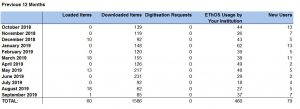Today, we are celebrating our Open Access doctoral theses.
There are 822 theses available through BURO. Furthermore, BU theses have been downloaded 1586 from EThOS in the last year.

Some highlights from our collection of theses include:
European Union
European integration reassessed: a grounded theory approach.
An analysis of the perceived effects of European Economic Monetary Union upon the hotel industry in the north of Portugal
Social media
Problematic attachment to social media: lived experience and behavioural archetypes.
Audience at the gates: how the BBC is using social media to identify talent and involve audiences in programme production.
Hackers gonna hack: investigating the effect of group processes and social identities within online hacking communities.
News
News, activism and social media: reporting the Egyptian Revolution and its aftermath by Al-Jazeera, BBC, CNN, RT and XINHUA.
Politics, terrorism and the news media: a case study of Saudi Arabia (2006-2007).
Climate change
Impact of climate change on extinction risk of montane tree species.
Tourist understanding of and engagement with the climate change impacts of holidays.
Predicting ecological impacts of climate change and species introductions on a temperate chalk stream in Southern Britain – a dynamic food web model approach.
Heritage
The Local community as a stakeholder group and its participation in UNESCO’s World Heritage nomination process: Jatiluwih Village, Bali, Indonesia.
Understanding heritage: multiple meanings and values.
Roman Britain
Chickens in the archaeological material culture of Roman Britain, France, and Belgium.
Making the invisible, visible. Iron age and roman salt-production in Southern Britain.
Integrating zooarchaeology into studies of Roman Britain and Medieval Russia.
Healthiness, through the material culture of the late iron age and roman large urban-type settlements of South-East Britain.
Health
Measuring what works: a mixed-methods evaluation of women’s groups on maternal health uptake in rural Nepal.
On being a mental health service user and becoming a service user representative: an autoethnography.












 Beyond Academia: Exploring Career Options for Early Career Researchers – Online Workshop
Beyond Academia: Exploring Career Options for Early Career Researchers – Online Workshop UKCGE Recognised Research Supervision Programme: Deadline Approaching
UKCGE Recognised Research Supervision Programme: Deadline Approaching SPROUT: From Sustainable Research to Sustainable Research Lives
SPROUT: From Sustainable Research to Sustainable Research Lives BRIAN upgrade and new look
BRIAN upgrade and new look Seeing the fruits of your labour in Bangladesh
Seeing the fruits of your labour in Bangladesh ECR Funding Open Call: Research Culture & Community Grant – Apply now
ECR Funding Open Call: Research Culture & Community Grant – Apply now ECR Funding Open Call: Research Culture & Community Grant – Application Deadline Friday 12 December
ECR Funding Open Call: Research Culture & Community Grant – Application Deadline Friday 12 December MSCA Postdoctoral Fellowships 2025 Call
MSCA Postdoctoral Fellowships 2025 Call ERC Advanced Grant 2025 Webinar
ERC Advanced Grant 2025 Webinar Update on UKRO services
Update on UKRO services European research project exploring use of ‘virtual twins’ to better manage metabolic associated fatty liver disease
European research project exploring use of ‘virtual twins’ to better manage metabolic associated fatty liver disease